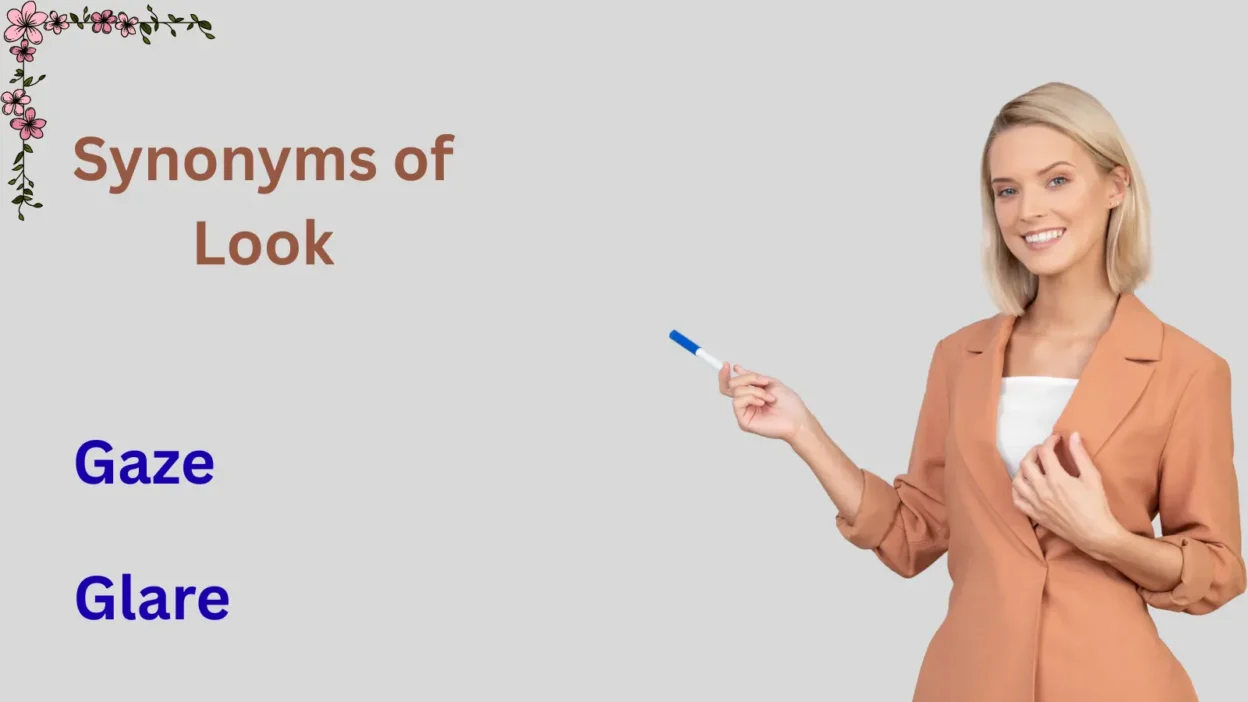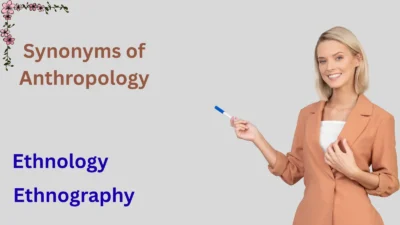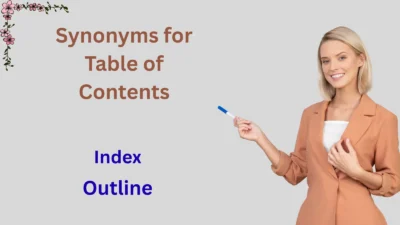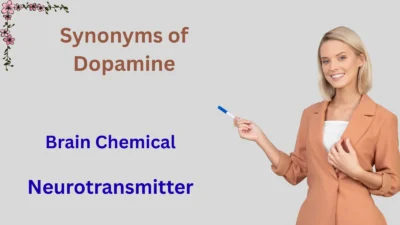Synonyms of Look, such as Glance, Gaze, and Glare, highlight the many ways we direct our eyes and attention. For example, “Glance” suggests a quick or casual view, while “Gaze” emphasizes a long, thoughtful, or admiring look. On the other hand, “Glare” conveys intensity—often sharp or unfriendly. These terms capture different aspects of looking, from a soft moment of admiration to a fleeting check or a piercing stare.
If you’re writing about emotions, body language, or even storytelling, choosing the right synonym helps you set the perfect mood. In this guide, we’ll explore a range of words that can replace look and show when each fits best.
These synonyms of look not only expand your vocabulary but also make your writing more vivid and precise. From subtle expressions to dramatic stares, the language of looking is as expressive as the eyes themselves.
What Does Look Mean?
Look means to direct one’s eyes toward something, either quickly, carefully, or with a specific feeling. It can describe both a simple action—like turning your head—or a deeper expression that communicates emotions without words.
Depending on how you use the word, look can evoke:
- Curiosity (a quick look around the room)
- Admiration (a loving look at someone special)
- Suspicion (a doubtful or questioning look)
- Intensity (a sharp look that carries meaning beyond words)
Synonyms of Look with Usage Guidance
1. Glance
Meaning: A quick or brief look.
Example: “She gave him a glance before leaving.”
Use When: Casual, fleeting observations.
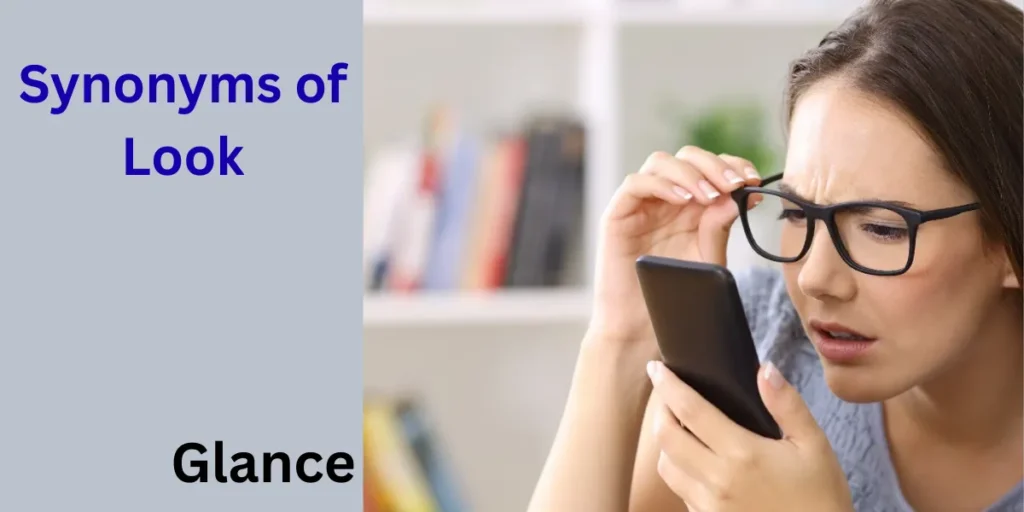
2. Gaze
Meaning: A steady and often admiring look.
Example: “He gazed at the stars in awe.”
Use When: Romantic, poetic, or reflective tone.
3. Glare
Meaning: A sharp or angry look.
Example: “The teacher glared at the noisy students.”
Use When: Strong, negative emotions.
4. Stare
Meaning: A long, fixed look.
Example: “He stared at the painting for hours.”
Use When: Neutral or intense focus.
5. Peek
Meaning: A quick or secretive look.
Example: “The child peeked through the curtains.”
Use When: Playful or sneaky tone.
6. Peep
Meaning: A small, often hidden look.
Example: “She peeped into the room quietly.”
Use When: Secretive, innocent, or childlike tone.
7. Behold
Meaning: To look with admiration or reverence.
Example: “Behold the beauty of the sunset.”
Use When: Dramatic, poetic, or formal style.
8. Observe
Meaning: To look carefully or study closely.
Example: “The scientist observed the reaction.”
Use When: Formal, scientific, or analytical contexts.
9. Examine
Meaning: To look at something carefully for details.
Example: “The doctor examined the patient’s injury.”
Use When: Medical, professional, or investigative tone.
10. Inspect
Meaning: A close and critical look.
Example: “The mechanic inspected the car engine.”
Use When: Technical or professional examination.
11. Scrutinize
Meaning: To look at something critically and in detail.
Example: “The lawyer scrutinized the contract.”
Use When: Serious, formal, or evaluative tone.
12. Glower
Meaning: A sullen or angry look.
Example: “He glowered at his rival from across the room.”
Use When: Strong dislike or anger.
13. Peer
Meaning: To look closely or with difficulty.
Example: “She peered into the darkness.”
Use When: Struggling to see or trying to detect something.
14. View
Meaning: To look at something with perspective.
Example: “We viewed the city from the rooftop.”
Use When: Neutral, formal, or descriptive.
15. Witness
Meaning: To see an event happen.
Example: “They witnessed the historic signing.”
Use When: Serious, legal, or historical contexts.
16. Eye
Meaning: To look at with curiosity or desire.
Example: “He eyed the last piece of cake hungrily.”
Use When: Informal, often with desire or intent.
17. Survey
Meaning: To look over broadly or systematically.
Example: “She surveyed the landscape below.”
Use When: Broad, evaluative observation.
18. Regard
Meaning: To look at with consideration or respect.
Example: “He regarded her with admiration.”
Use When: Formal or respectful tone.
19. Contemplate
Meaning: To look thoughtfully or reflectively.
Example: “She contemplated the meaning of the painting.”
Use When: Reflective, philosophical, or meditative contexts.
20. Examine Closely
Meaning: To study carefully and in detail.
Example: “He examined the evidence closely.”
Use When: Serious or investigative writing.
21. Discern
Meaning: To look carefully and recognize.
Example: “From a distance, she could barely discern his face.”
Use When: Subtle, intellectual, or descriptive writing.
22. Spot
Meaning: To notice or identify quickly.
Example: “I spotted him in the crowd.”
Use When: Casual, quick recognition.
23. Glint
Meaning: A quick, shiny look (figurative).
Example: “A mischievous glint appeared in his eyes.”
Use When: Figurative, expressive description.
24. Ogle
Meaning: To look at with inappropriate or obvious desire.
Example: “He ogled at her throughout the evening.”
Use When: Negative, suggestive, or humorous contexts.
25. Browse
Meaning: To look casually through things.
Example: “She browsed the bookstore for hours.”
Use When: Shopping, casual viewing.
26. Scan
Meaning: To look quickly over an area or text.
Example: “He scanned the document for errors.”
Use When: Quick searching or reviewing.
27. Skim
Meaning: To look at something quickly without detail.
Example: “She skimmed through the article.”
Use When: Reading lightly or quickly.
28. Admire
Meaning: To look with approval or admiration.
Example: “They admired the painting’s beauty.”
Use When: Positive, appreciative tone.
29. Check Out
Meaning: To look at something with interest.
Example: “Check out this amazing photo.”
Use When: Informal, casual conversations.
30. Cast a Look
Meaning: To direct a look toward someone or something.
Example: “She cast a curious look in his direction.”
Use When: Neutral, literary tone.
Choosing the Right Synonym Based on Tone and Context
- Quick & Casual: Use glance, peek, skim, spot, check out.
- Romantic & Poetic: Use gaze, behold, admire, contemplate.
- Negative & Strong: Use glare, glower, ogle.
- Professional & Formal: Use observe, inspect, scrutinize, and regard.
- Exploratory & Broad: Use survey, view, witness, peer.
Cultural Note: In everyday English, casual words like look, glance, and check out are common. More formal words like scrutinize or regard are found in literature, law, or academic contexts. Meanwhile, ogle carries a cultural negative connotation, often tied to disrespectful behavior.
Conclusion
In conclusion, expanding your vocabulary with synonyms of look can dramatically improve how you express observation, attention, and emotion in writing. If you choose glance for a quick peek, gaze for admiration, stare for intensity, or peek for curiosity, each word carries its own nuance and tone.
Using these alternatives thoughtfully allows you to convey the exact feeling or action you intend, making your writing more vivid and precise.
By exploring and practicing these synonyms, you not only enhance your communication but also make your sentences more engaging and dynamic.
So next time you want to describe how someone sees or observes, remember there’s a whole world of words waiting beyond just look.


